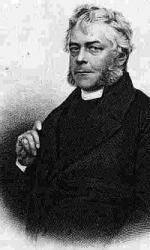
1802 - 1881 Hymnal Number: d1047 Author of "Though now the nations sit beneath" in Church Melodies, a Collection of Psalms, Hymns and Spiritual Songs Leonard Bacon, D.D., was born in Detroit (where his father was a missionary to the Indians), February 19, 1802, and educated at Yale college and at Andover. In 1825 he was ordained Pastor of the Centre Church, New Haven, and retained that charge until 1866, when he was appointed Professor of Theology in Yale Divinity School. This professorship he resigned in 1871; but till his death in 1881, he was Lecturer on Church Polity. He died December 23, 1881. Dr. Bacon rendered important service to hymnology both as writer and compiler. While a student at Andover, he edited an important and now rare tract entitled Hymns and Sacred Songs for the Monthly Concert [of Prayer for Missions], Andover, September 1823. This contained the three hymns following, which are his:-
Weep not for the saint that ascends. Death of a Missionary.
Land where the bones of our father are sleeping. Missions. This was brought into notice in Great Britain through its insertion in the Evangelical Magazine, March, 1824.
Wake the song of jubilee. Missions. Of these No. 1 is found in Lyra Sac. Amer., p. 6 and No. 3 was adopted, with alterations, by Pratt in his Ps. and Hys. (Lond. Seeley & Co,. 1829), fro which it passed into Greene and Mason's Church Psalmody, 1831, and the Church Psalmist of the Evangelical Christians (N. Y., 1845, 7th ed.). This altered text, with some further changes, was adopted by the author in his Appendix to T. Dwight's revised ed. of Watt's Psalms, 1833. This Appendix also contained three newe hymns by him, viz.:-
Though now the nations sit beneath. Missions. This is based on a hymn by Sarah Slinn, "Arise in all Thy splendour, Lord" (q.v.), which Dr. Bacon had partly rewritten for his Andover Tract, above noted. In the Appendix to Dwight he substituted new verses for what remained of her's in the Tract, and then justly claimed the whole as his own.
O Thou Who hast died to redeem us from hell. Holy Communion.
God of our fathers, to Thy throne. Thanksgiving. In 1845 Dr. Bacon was joint compiler with Dr. E. T. Fitch, and several others, of Psalms & Hymns for Christian Use and Worship,, pub. "by the General Association of Connecticut."
To this collection he contributed the four hymns following:-
Here, Lord of life and light, to Thee. Institution of a Minister. This was written March 9, 1825, for his installation as pastor of the First Church, New Haven, and first published as above, No. 559, in 4 stanzas of 4 lines, and headed "Ordination in an ancient New England Church."
O God, beneath They guiding hand. American Anniversary Hymn. This is a favorite American Anniversary hymn. It is abbreviated and altered from his hymn, "The Sabbath morn is as bright and calm," which he wrote for the Bicentenary of New Haven, 1833. In this revised form it was first published as above, No. 619, in 5 stanzas of 4 lines, and appointed "For the twenty-second of December."
O God of Abraham, ever sure. Prayer on behalf of the Young. This was written as a substitute for Mrs. Hyde's "Dear Saviour, if these lambs should stray," the use of which was refused by the owners of the copyright of Nettleton's Village Hymns (1824). In the Psalms & Hymns, it is No. 635, in 4 stanzas of 4 lines, and headed "Prayer for the children of the Church."
Hail, tranquil hour of closing day. Evening. This popular hymns was written under the same circumstances as the preceding, and as a substitute for Mr.s Brown's Twilight hymn, "I love to steal awhile away." It is No. 706 of the Psalms & Hymns, 1845, in 5 stanzas of 4 lines, and entitled "Evening Twilight."
How sweet, thro' long remembered years. Evening. In the Church Praise Book., N.Y., 1882, No. 15, is composed of stanzas iii.-v. of No. 10.
--John Julian, Dictionary of Hymnology (1907)
Leonard Bacon

